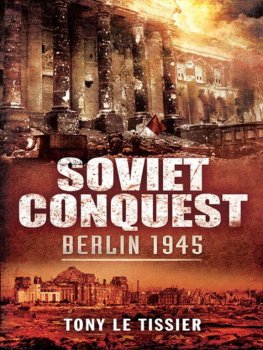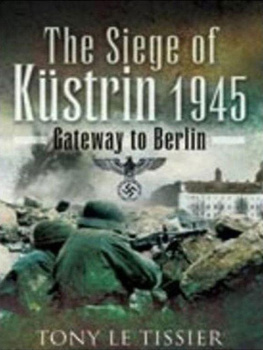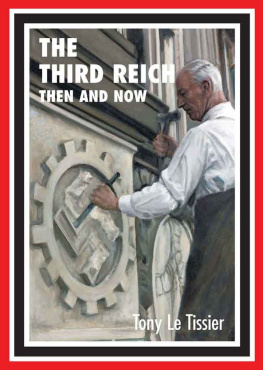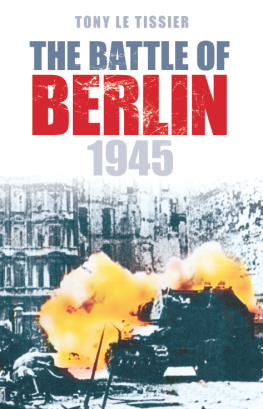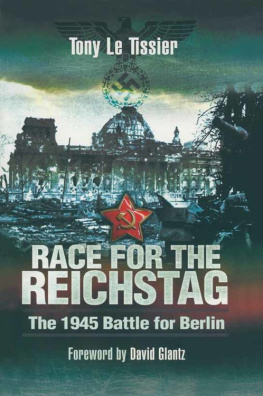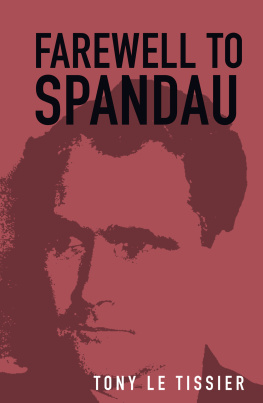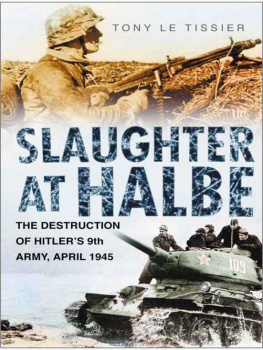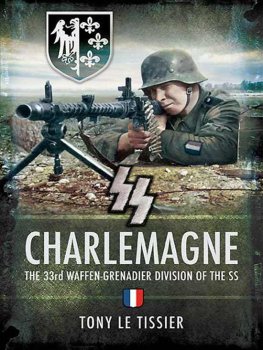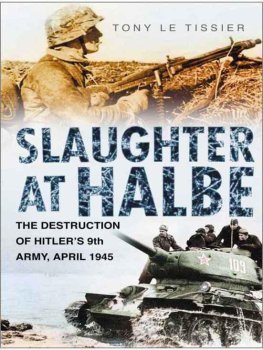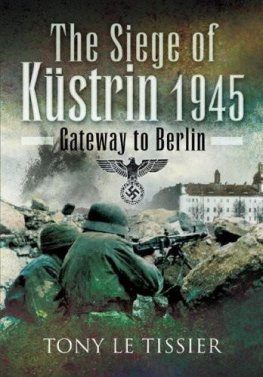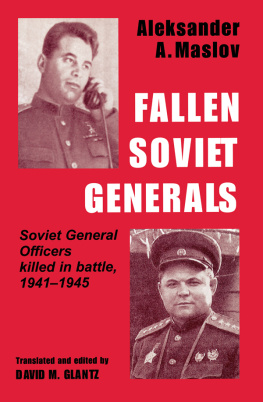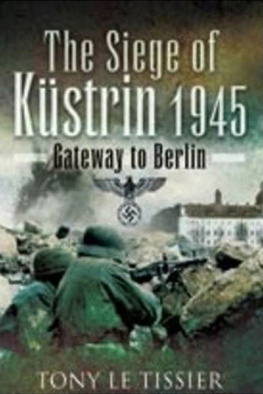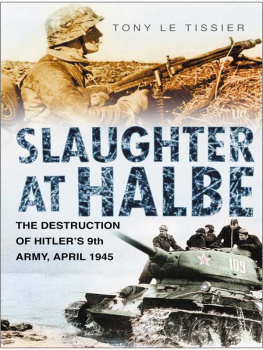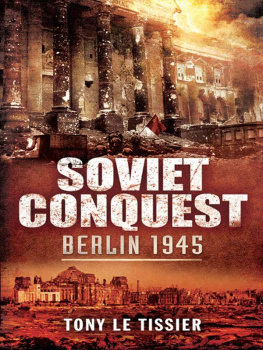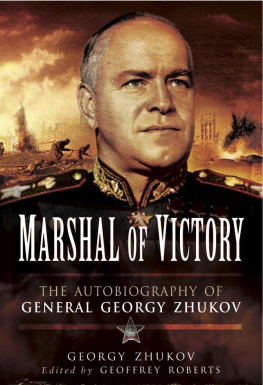Tony Le Tissier
SOVIET CONQUEST
Berlin 1945

List of Maps and Illustrations
The Second World War ended in Europe as a triumph for the Allies, but especially for the Soviets with their taking of Berlin. Of course things had not gone as smoothly as the Soviets would have liked and, as always, involved massive casualties. One would have expected a flood of Soviet literature about the Second World War, but Stalin steered away from this course by banning the publication of personal accounts and having an official Soviet history compiled by a team of historians promoting Stalins own status as the supreme commander-in-chief. Then in 1972 Marshal Chuikovs book was published as a critical attack on Marshal Zhukovs handling of the battle for Berlin.
In fact Zhukov had blundered early in the initial stages of the battle for Berlin. When Stalin had taunted him with his lack of success in contrast to his rival Marshal Konievs crossing of the Neisse River to the south, Zhukovs reaction had been to order his tank armies into the Seelow Heights battle, contrary to the original plan of reserving them for the breakthrough to Berlin once these forward German positions had been destroyed. The result was complete confusion on the cramped battlefield as the tanks belatedly tried to intervene; instead of the anticipated one-day breakthrough battle, it took Zhukovs 1st Byelorussian Front four whole days and enormous numbers of casualties to complete this first stage. The follow through to Berlin consequently involved considerable readjustment to the plan of battle as the exhausted infantry struggled to keep up with the advancing armour.
Meanwhile, unknown to Zhukov, Stalin had permitted Koniev to intrude on the Berlin battlefield with his 3rd and 4th Guards Tank Armies. Stalin further banned the Red Air Force from informing Zhukov of Konievs participation, while the latter urged his forces to beat his rival into Berlin.
Nevertheless it was the 2nd Guards Tank Army of Zhukovs Front that first broke into the eastern suburbs of Berlin on the morning of 21 April, closely followed that evening by the scouts of the 3rd Guards Tank Army. Next day Koniev ordered the 3rd Guards Tank Army to prepare to assault across the Teltow Canal, which formed part of the citys southern boundary, on the morning of the 24th, adding considerable artillery and air support to the operation. Allegedly Zhukov did not learn of the presence of Konievs troops until the evening of that day, when he had officers sent to confirm who and what was involved and what their objectives were.
Once both Fronts were engaged within the city, Stalin was obliged to draw and adjust their boundaries as the fighting continued. However, when Koniev launched a massive attack on the morning of the 28th, with the aim of occupying the Tiergarten, it was soon discovered that his troops were firing into the rear of Chuikovs troops, occupying an area already taken. It was Konievs turn to be humiliated. Mortified, he left the 3rd Guards Tank Army to continue the battle on a modified line of advance, while Zhukov went on to capture the prestigious goal of the Reichstag.
The fall of Berlin brought Zhukov his third gold star as a Hero of the Soviet Union, an honour Stalin could not deny him. Zhukov represented the Soviet Union at the surrender ceremony conducted at Karlshorst on 8 May, with his co-signatory Air Chief Marshal Sir Arthur Tedder of the UK and witnesses General Carl Spaatz of the US Strategic Air Force and General Jean de Lattre de Tassigny of the 1st French Army. The reviewing officer at the victory parade on Red Square should have been Stalin as commander-in-chief, but Zhukov later learned that Stalin had been unable to control the magnificent horse selected for the role, so Zhukov was given the task.
Later in the year Stalins henchman, Viktor Abakumov, appeared in the Soviet Zone of Germany and started arresting members of Zhukovs staff a distinctive sign of Stalins lack of favour for his deputy. Shortly afterwards Stalin accused Zhukov, in his absence, of claiming the credit for Red Army victories during the war and belittling the role of the Stavka, the Soviet high command.
In March 1946 Zhukov was recalled to Moscow and appointed Commander-in-Chief of the Ground Forces, but promptly came into conflict with Bulganin, the First Deputy Commissar for Defence, who blocked Zhukovs access to Stalin. From then on, Zhukov was gradually stripped of all his offices and appointments. When Stalin died in March 1953, his successor, Nikita Khrushchev, reinstated Zhukov as Minister of Defence and in 1956 had Zhukov awarded his fourth star as Hero of the Soviet Union on his 60th birthday, but a year later relieved him of all his duties with the accusation of being inclined to adventurism in the Soviet Unions foreign policy and overall lacking in the Party spirit.
Deprived of his position as a member of the Presidium and the Central Committee and as Minister of Defence, Zhukov withdrew to the dacha outside Moscow that Stalin had given him for life during the war. Pravda then published an article by Marshal Koniev that amounted to a scathing attack on Zhukovs role both during the war and as Minister of Defence. In March 1958 Zhukov was further humiliated by his contrived retirement as a Marshal of the Soviet Union; this was an unprecedented step, for marshals were normally transferred to the Group of Inspectors, whose occasional duties justified the continuation of their active duty perquisites, such as an aide-de-camp and a chauffeur-driven car. Zhukov was now fair game for his old antagonists, and in March 1964 Marshal Chuikov attacked Zhukov for not going on to take Berlin in February 1945, his book The End of the Third Reich being the first of the senior commanders memoirs allowed to be published after the war.
In 1965, under the Brezhnev regime, Zhukov was invited to attend a celebration of the twentieth anniversary of the victory over Germany, at which he received a great ovation. The next day he joined his old colleagues in reviewing the victory parade from the top of Lenins mausoleum.
Stalins clampdown on personal accounts of experiences in the Second World War continued long after his death in 1953, and it was only in 1967 that that of Marshal Chuikov became to be the first to be published, even then intended as a snub to Zhukov, whose attempts to publish his own account had been repeatedly turned down.
Other accounts, including Zhukovs at last in 1974, then followed, adding some light to the otherwise strictly Communist Party conformist theme.
Despite the length of this introduction, which I believe to be necessary for the overall comprehension of the reader, this book has been produced with a view to providing some interesting details and a wider view of the final battle for Berlin in 1945. It consists of the translations of six personal accounts taken from the East German editions of the original Soviet publications, omitting those of Marshals Chuikov, Koniev and Zhukov, whose autobiographies have long been available in the English language.
Chapter 1
Spearhead
By Marshal of Tank Troops Michael Yefimovitch Katukov
When Marshal Zhukov prepared his 1st Byelorussian Front for the battle of Berlin, Katukov was the colonel-general commanding the 1st Guards Tank Army. He already had considerable experience of armoured warfare, having been involved in the defence of Moscow, the battle of Kursk and the consequent clearance of the Ukraine, Poland and Eastern Pomerania.
* * *
Our army received new vehicles before the storming of Berlin. Apart from that the 11th Tank Corps under General Yushtchuk was attached to us, so that at the beginning of the Berlin operation we had over 854 fit for action. We had not had such a large number of tanks and self-propelled guns throughout the whole war.

